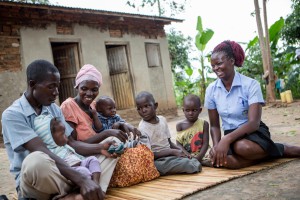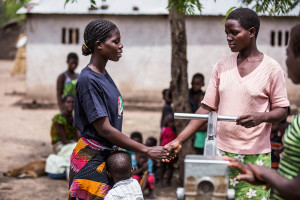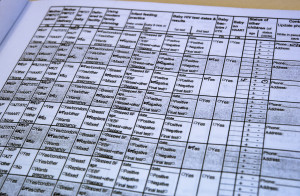Harnessing the Potential of mHealth

Community Mentor Mother following up with family in Uganda
In 2015, m2m reached 35% more clients compared to 2014, driven in large part by our Community Mentor Mothers (CMM). That is because when CMMs visit pregnant women and new mothers at their homes who have not engaged with the health system or have missed key appointments, they also have the opportunity to interact with other family members — including male partners, older children, and adolescents—and link them to the clinic for essential health services. With the number of clients expected to climb even further as we engage with more communities and link them to health facilities and services, technological innovation has become a necessity.
Venturing into mHealth
That is where mHealth comes in. Through the support of longtime partner Johnson & Johnson, m2m commissioned the development of an Electronic Client Appointment Diary, modeled after our bulky paper-based system that was showing great promise.
Structured like a normal calendar-based diary, the new mobile app allows Mentor Mothers based at health facilities to effectively and efficiently track client appointments to make sure they showed up. Women who miss appointments are followed up through text messages, phone calls, and home visits (by Community Mentor Mothers or through other local/district support systems).
“The app breaks down clients, the date that they are suppose to return to the clinic, and I already know the previous day who I will be seeing. This also makes it easier to follow up with clients and find them when they don’t visit the clinic. My responsibilities are now easier to manage,” says Grace Thage, a m2m Site Coordinator in South Africa.
The app has also improved m2m’s routine monitoring and evaluation, providing opportunities for insightful operations research and informing programme innovation.
With grant funding from Comic Relief, the Electronic Client Appointment Diary was rolled out in South Africa in early 2016, and is now being rolled out in an additional five countries.

Community Mentor Mother in Malawi (left)
Linking to the Community
m2m is currently in the process of developing a second mHealth application that will enable Community Mentor Mothers to retrieve information on an entire family while visiting them at their home, so they can make sure everyone is accessing healthcare, keeping their appointments, and remaining adherent and in care. Mentor Mothers will also be able to monitor whether clients are accessing and adhering to a comprehensive package of reproductive, maternal, newborn, child health (RMNCH) services critical to the health of the entire family, including linkages to care and referrals for family planning, breast and cervical cancer screening, child immunisation, gender-based violence support, neonatal male circumcision, malaria, nutrition, and TB.
Throwing Light on the Subject
Comparing m2m’s old paper-based monitoring and follow-up systems to the applications being developed under our new mHealth agenda is like going from candle light to electricity.

m2m logbook
“With the old system there was so much admin involved which sometimes compromised my time with the clients. I had so many things to update, like the tally sheet, the Active Client Follow Up (ACFU) book, and the log book. Now I’m using the app and it has really helped me a lot. All of the information is up-to-date and in one place,” explains Irene Nkosi, a Site Coordinator in South Africa.
While data systems alone cannot end the AIDS pandemic, improved, robust systems that ensure that clients are managed across their health needs serve as critical tools in ending HIV transmission. The mHealth technology enables m2m to strengthen communications between communities and health facilities, providing a foundation for truly integrated facility-to-community-based service delivery. Accurate information will be retrievable in real time so that clients who miss appointments will be instantly identified by Mentor Mothers and followed up and engaged with before they are lost to care. m2m expects that this will lead to improved retention of mothers and their babies and improved health outcomes for entire families — both critical to finally eliminating paediatric AIDS.






















